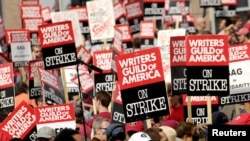The contract for television and film writers is nearing expiration and a costly strike looms that could send some popular televisions shows into reruns.
The writers contract expires at 12:01 a.m. PDT Tuesday and picketing could begin that morning. Representatives for the writers and producers are engaged in a media blackout, meaning it is unclear how far apart the sides remain or how likely a strike will be called.
The Writers Guild of America and the Alliance of Motion Picture and Television Producers have been negotiating off and on since March 13 but have been unable to reach an agreement on a new contract. The main sticking points are compensation and healthcare.
WGA's members overwhelmingly approved a strike late last month. A strike would immediately end the jokes and witty banter on late-night talk shows, and could eventually impact everything from daytime soap operas to major motion pictures in development.
In a memo to WGA members Sunday, the writers' negotiators warned to ``be ready to strike Tuesday.''
"If you've got anything great in your office on a studio lot, consider packing it up on Monday — just in case," it read.
The memo, though, also said negotiations could continue after the deadline.
A strike would be first work stoppage by writers in nearly a decade. In 2007 and early 2008, a 100 day writers strike halted productions on numerous shows, led to a shortened television season and even impacted major film releases.
The dispute is driven in large part by shifts in how television is consumed, with streaming platforms such as Netflix and Amazon joining broadcast and cable TV and garnering viewers, critical and audience love, and awards.
There are more television shows than ever, but the work for writers has changed. Most series run for fewer than the traditional 22 to 24 broadcast episode season.
The shorter seasons of eight to 12 episodes translate into less pay for writers, who are paid on a per-episode basis.
The film industry can better weather a shorter strike, but felt the impact of the 2007-08 strike. Several films, including "X-Men Origins: Wolverine" and "Transformers: Revenge of the Fallen" were affected and were met with poor reviews. Many of the filmmakers and stars involved later said the movies simply didn't have the screenplay they needed.
That strike also affected numerous industries that support film and television production. A Milken Institute estimate found the strike cost the California economy $2.1 billion.




